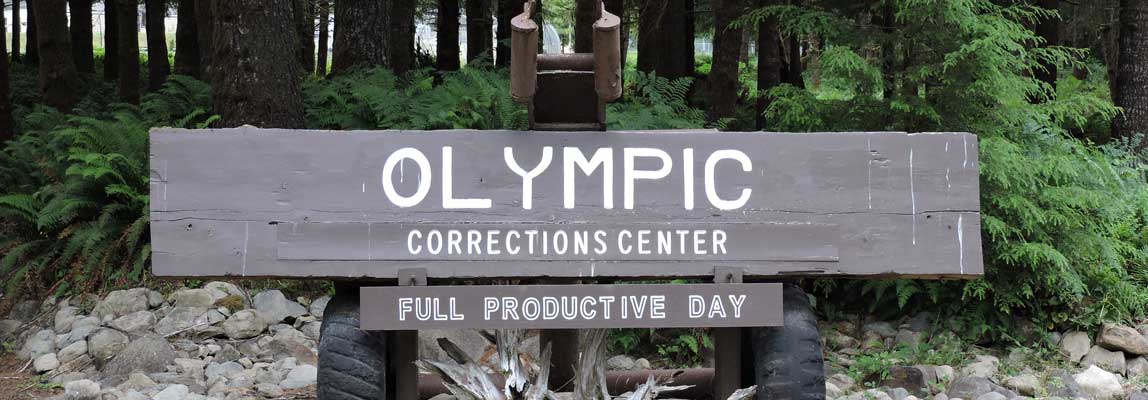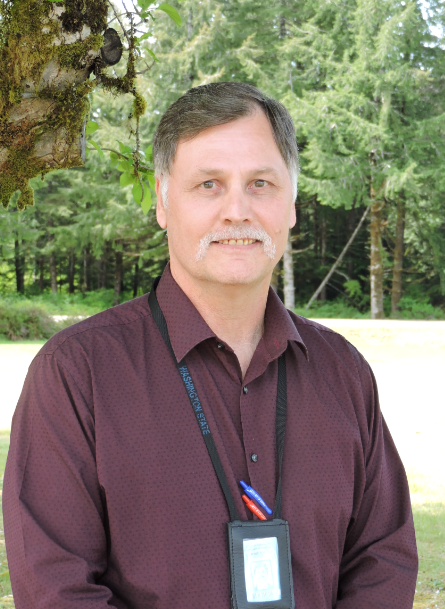Olympic Corrections Center (OCC)

Facility Alerts & Notices
Before visiting, check this page for notices and alerts that may impact your travel plans.
- Monday, June 2, 2025: South Mainline Road is closed until further notice. Visiting is open.
- Please be advised when using Microsoft Bing for the location of Olympic Corrections Center, the address is incorrect. Olympic Corrections Center is located south of Forks WA 98331 not Montesano WA 98563. The street address is 11235 Hoh Mainline as written on the site is correct. The map also shows the correct location.
Contact & Location
At A Glance
Local Family Council
DOC Policy 530.155 Family Councils (pdf)
Custody Level: Minimum
Living Units & Custody Levels
Capacity: 272 male inmates
Year Opened: 1968
OCC Visiting Information
Lodging and Transportation Assistance Program (LTAP)
The Lodging and Transportation Assistance Program (LTAP) was developed to help reduce the financial burden placed on families due to the cost associated with travel to/from a facility. Qualifying applicants may request up to two separate $50 reimbursements to assist with the cost of fuel and/or a hotel stay when visiting their loved on. You can find more information and the application at the link above.
Visitor Application Process
To visit an inmate, you must complete the visitor application process. Go to the Prison Visits webpage for information about what is required in your specific circumstances to complete the visitor application process.
The visitor application process must be completed for both Prison Visits and Video Visits.
Visitor Guidelines
The general guidelines that are applicable to all prison facilities is detailed in DOC Policy 450.300 Visits for Incarcerated Individuals (pdf). OCC also has its own Visitor's Guidelines (pdf) detailing important notices, visiting rules, guidelines for all visits (prison and video), and regular visiting hours for each housing unit.
OCC's Regular Visiting Hours have also been published below as a quick reference for your convenience.
Scheduled Events
Many scheduled events are hosted at OCC. These events may disrupt regularly scheduled visiting hours. Please refer to the OCC Event Calendar (pdf) for information regarding upcoming scheduled events.
Regular Visiting Hours
Below are the regularly scheduled visiting hours for each unit that accepts visitors at OCC. Regular visiting hours are subject to change due to unplanned incidents, as well as scheduled events. Please check the facility alerts & notices, OCC Event Calendar (pdf), OCC Visit Calendar (pdf), and Visitor's Guidelines (pdf) for information that may impact your travel plans.
Visitors check-in times are 8:45 a.m. - 9:15 a.m. and at 10:45 a.m. - 11:15 a.m. only. Check-out time is 2:15 p.m. for all visits.
| Saturday | Sunday | State Observed Holidays |
|---|---|---|
| 9:00 a.m. - 2:15 p.m. | 9:00 a.m. - 2:15 p.m. | 9:00 a.m. - 2:15 p.m. |
Video Visiting Hours
Per Video Visit Expectations (pdf), video visits will be scheduled in 30 minute increments and may not exceed one hour in duration. Video visits may be scheduled by an approved visitor through Securus at least 24 hours in advance.
| Days | Time |
|---|---|
| Daily | 7:00 a.m. – 10:00 a.m. 11:00 a.m. – 1:00 p.m. 2:30 p.m. – 3:00 p.m. 4:00 p.m. – 5:30 p.m. 6:00 p.m. – 9:00 p.m. |
Facility Programs
Academic & Partnership Programs
- Adult Basic Education/GED & HS21+ (High School Diploma)
- Construction Trades Apprenticeship Preparation (CTAP)
- College and Career Planning
- English 090
- English 101
- Math 107
- Overhaul-Unrelenting Transfiguration (O-UT)
- Sustainability in Prisons Project
Research Based Programs
- Parenting Inside Out
- Redemption
- Reentry
- Substance Abuse Therapeutic Community (TC)
- Thinking for a Change (T4C)
Work & Vocational Programs
- Community Work Crews
- Department of Natural Resources Work Crews
- Flagging
- Food Service
- Janitorial
- Maintenance (carpentry, electrical, recycling, compost)
- Wastewater Treatment
- Wood Products Shop
Community Involvement
Serving the Community
Community Service crews provide services to local government agencies such the Olympic Natural Resource Center, the Quillayute Valley School District, Quillayute Valley Park and Recreation District, and non–profit organizations such as the Forks Museum and West End Youth League. Items designed and built by the Woods Products Shop, crafted with donated tools and materials, are donated to the Quillayute Valley Scholarship Auction, Cherish Our Children, and others.
Sustainable Communities
Olympic Corrections Center supports the Department's goal of working for sustainable, safe communities. The facility consistently looks for ways to save energy, reduce waste, and become more efficient in its plant operations. Sustainability is also demonstrated through the compost and recycling programs, in addition to transitioning to energy saving appliances and installing water meters.
Art in Public Places
The Art in Public Places (AIPP) program facilitates the acquisition, placement, and stewardship of artwork in state-funded building projects throughout Washington. The Washington State Legislature established the AIPP program in 1974 to acquire artwork for educational institutions and state agencies, funded by ½ of 1 percent of the state’s portion of construction costs. Today, the State Art Collection includes more than 4,700 artworks.
Family
Local Family Council (LFC)
Each prison facility maintains a Local Family Council (LFC), providing family members the opportunity to meet regularly with the facility staff to ask questions, receive information, and share their perspectives. Meetings typically involve the facility Superintendent or Associate Superintendent, along with other department representatives and facility visitors. They are generally held during even-numbered months throughout the year, and any approved visitor may attend. To sign up to attend these meetings or join the LFC, contact your Local Family Council Representative.
Statewide Family Council (SFC)
The Department also maintains a Statewide Family Council (SFC), consisting of one elected representative from each of the Local Family Councils, the Statewide Program Manager, and various members of the executive leadership team from DOC Headquarters along with visitors or other community members who have a vested interest. These meetings are open to the public and generally occur during odd-numbered months throughout the year. To see past meeting minutes as well as information on upcoming meetings and how to join, visit the Statewide Family Council site and click on the upcoming agenda; log in information is located in the top right corner of the agenda.
Family Events(pdf)
Family relationships are essential during incarceration and provide emotional support, stability, and a sense of connection that can greatly influence an individual's success both during and after their incarceration. Family friendly events provide the opportunity for incarcerated individuals and their visitors to participate in meaningful, family centered activities that strengthen these bonds. Each year, at least four such events are organized at each facility - two are focused on strengthening adult relationships and two are dedicated to nurturing the child/parent connections. All events have set criteria and must comply with security, safety, and health requirements and in alignment with the Department’s Mission and Core Values.
Family Support and Navigation Guide
Family members experience both a physical and mental loss when a loved one becomes incarcerated. In order to maintain connections and provide support for their loved one, families must learn to navigate their way through the Corrections system. This can be a scary time for all involved. The Family Support and Navigation Guide was developed to provide you with information relevant to your loved one’s incarceration and guide you to resources during your time with Washington State Department of Corrections.
Lodging and Transportation Assistance Program (LTAP)
The Lodging and Transportation Assistance Program (LTAP) was developed to help reduce the financial burden placed on families due to the cost associated with travel to/from a facility. Qualifying applicants may request up to two separate $50 reimbursements to assist with the cost of fuel and/or a hotel stay when visiting their loved on. You can find more information and the application at the link above.
Superintendent

Superintendent Scott Speer
Scott Speer began his career with the department in 1987 at McNeil Island Corrections Center as a Correctional Officer, where he worked in the segregation unit and was an active member of the McNeil Island Corrections Center (MICC) Emergency Response Team. Scott contributed to staff development by facilitating Control Tactics and First Aid classes. He promoted to a Correctional Sergeant in 1992 at Olympic Corrections Center and has worked through the ranks of Correctional Unit Supervisor, Correctional Lieutenant, and was promoted to Correctional Program Manager in 2018. Scott has served as the Interim Superintendent for the past eight months. During this time, he has reestablished programs, security routines and community relationships.
Throughout his 35-year career in corrections, Scott has led many committees, projects and teams. He has been a long-standing member of the statewide Emergency Management Committee, participating and leading Critical Incident Reviews and Emergency Management audits. Scott was also an original member of the Statewide Security Advisory Committee and established the facility’s accountability and current safety security process. Scott has served as the Facility Incident Commander, managing much of the facility’s response to COVID-19, since 2020.
Scott took on a huge role with the facility safety initiatives by reviewing all incoming individuals prior to their arrival at OCC for significant security concerns. He is largely responsible for developing key relationships with the local law enforcement agencies and the surrounding community. Scott maintains a people-centered focus, working to develop staff and assisting the population for successful reentry.”
